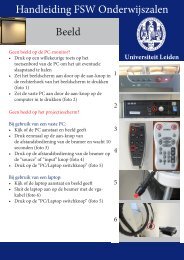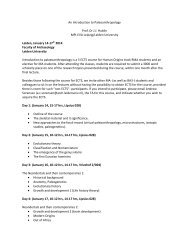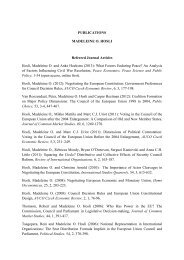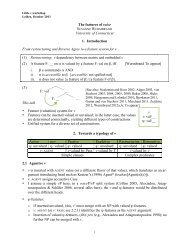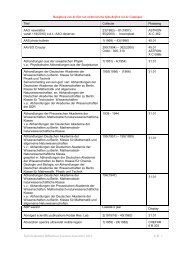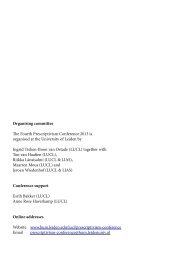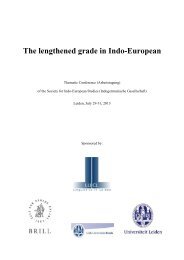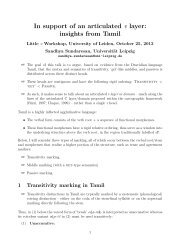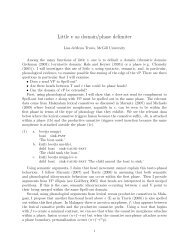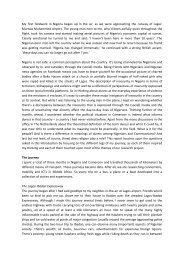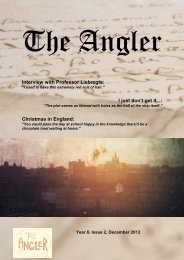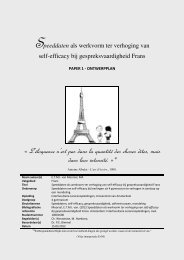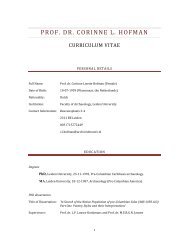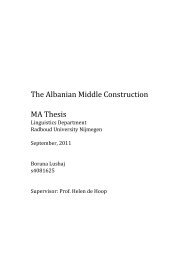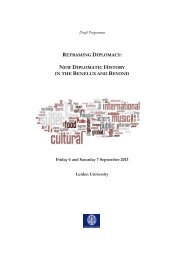Institute for History Annual Report 2010 - O - Universiteit Leiden
Institute for History Annual Report 2010 - O - Universiteit Leiden
Institute for History Annual Report 2010 - O - Universiteit Leiden
Create successful ePaper yourself
Turn your PDF publications into a flip-book with our unique Google optimized e-Paper software.
<strong>for</strong> men and women.<br />
Women at Risk? Male and Female Asylum<br />
Seekers in the Dutch Asylum Procedure<br />
1945-2000 (PhD-project) Tycho Walaardt<br />
Various researchers have raised the issue that<br />
female asylum seekers were granted more often<br />
refugee status than male asylum seekers in the<br />
Dutch asylum procedure. Jurists, sociologists and<br />
anthropologists gave several reasons why women<br />
are more successful within this procedure, but<br />
mostly these explanations are rather speculative.<br />
They also lack an historical component. The<br />
above-mentioned favourable position of women<br />
contrasts sharply with the dominant image of a<br />
refugee: a political active male dissident. In my<br />
dissertation I will try to answer the question how<br />
and why gender played a role in the asylum procedure<br />
since the Second World War. The contents<br />
of individual case files of asylum seekers, present<br />
in the IND-archive, will be my main source of<br />
in<strong>for</strong>mation. My hypothesis is that the arguments<br />
used by advocates of female asylum seekers to<br />
protest against a negative decision of the IND<br />
differed from the arguments used by advocates of<br />
their male counterparts. An advocate might be the<br />
individual himself, but could also be a friend, a<br />
relative, a colleague, a member of a refugee aid<br />
organization, a lawyer, a representative of a<br />
ministry, a politician, etc. By doing longitudinal<br />
research it seems plausible to distinguish<br />
constants, which were raised to defend male and<br />
female asylum seekers during different periods.<br />
<strong>Institute</strong> <strong>for</strong> <strong>History</strong><br />
133<br />
Transnational Ties with the Country of<br />
Origin: Moroccan Migrants and Their<br />
Descendants in the Netherlands, 1960-2000<br />
(PhD-project) Nadia Bouras<br />
Research shows that transnational participation is<br />
supposedly gendered. The field of institutional<br />
and public transnational activities is mostly a<br />
male-dominated area, whereas women are more<br />
engaged in the social life of the receiving society.<br />
These differential <strong>for</strong>ms of gender participation in<br />
transnational and local contexts are related to the<br />
fact that migration has different outcomes <strong>for</strong> men<br />
and women. Transnational ties imply the ways in<br />
which transmigrants maintain, build and rein<strong>for</strong>ce<br />
multiple linkages with their country of origin and<br />
the country of settlement. In my research I explore<br />
the linkages first and second generation<br />
Moroccans in the Netherlands maintain with their<br />
country of origin from a gender perspective. The<br />
implications of transnational-ism <strong>for</strong> both first en<br />
second generation Moroccan men and women will<br />
be considered. I will first explore the role migrant<br />
men and women of the first generation play in the<br />
maintenance of transnational ties, in which the<br />
gendered differences over time will be explained.<br />
Secondly, I will examine how these transnational<br />
linkages differ from the ties second generation<br />
Moroccans maintain.<br />
Ethnically Mixed Relationships in a<br />
Postcolonial Context, 1945-2000 (PhDproject)<br />
Charlotte Laarman<br />
My research focuses on mixed relationships of



